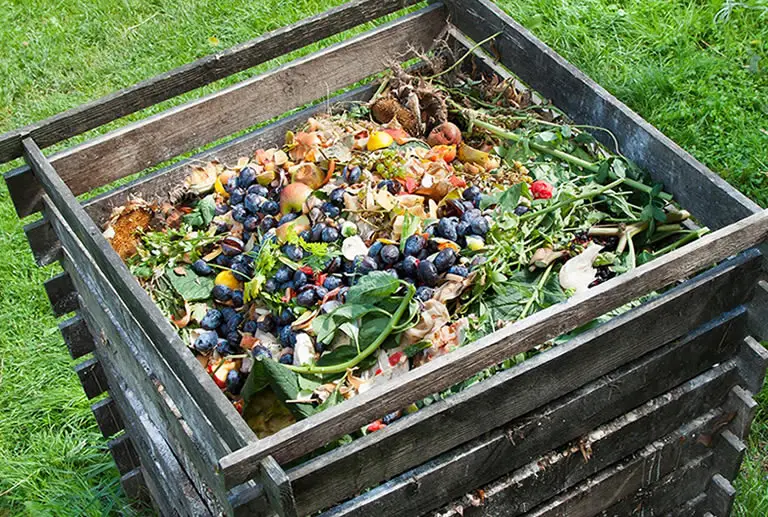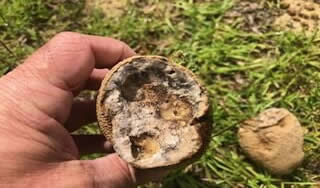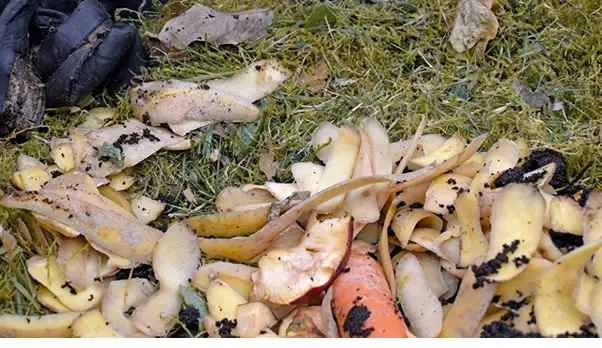Why Composting Potatoes Can Be Bad For Your Garden

So you have excess potatoes that are just wasting away and becoming inedible but you still want to put them to good use. Composting them is the first thought but potatoes and compost don’t have the same type of easy relationship that compost and other organic materials have.
Table of Contents
The Scary Truth About Composting Potatoes
So, can you compost potatoes safely?
Potatoes can be composted but you must be careful how you do it. Potatoes are quite susceptible to disease.
If the potatoes show sign of blight or any type disease do not compost them or you will infect your entire compost.
Potatoes also have a tendency to sprout new potato growth.
 So, potatoes that show any sign of disease should never be composted.
So, potatoes that show any sign of disease should never be composted.
To lessen this risk of new potatoes growing in your compost take action by chopping the potatoes into small chunks before composting.
Cooking them before composting will completely eliminate the chance of new growths.
You must be careful when composting potatoes
Potatoes, like all organic material, can be composted – at least in theory.
However, potatoes and compost don’t always play well together so you must be be careful when composting this specific vegetable.
Composting raw potatoes brings a few challenges that you will not have when composting uneaten cooked potatoes.
Potato peels also present challenges for the compost.
Let’s look at the potential problems composting potatoes presents and how to avoid the risks that go with them.
Potatoes are susceptible to disease
Potatoes are amazing produce. Potato crops are easy to plant, easy to maintain and grow easily.
They are also easy to store and last much longer than many other types of vegetables.
However, potatoes come with some very challenging downsides.
Potatoes are very susceptible to many different kinds of crop diseases, the most prolific being potato blight.
Potato blight is a fungus type of disease that infects the foliage and stems of plants and eats its way into the crop.
Water then washes these spores into the soil where they make their way into the tubers.
Potato blight is so serious that it can quickly destroy an entire crop of potatoes while simultaneously migrating to other plants and can make soil unusable for crop growth for several years.
Not only is potato blight devastating to potatoes but the spores can become airborne and easy infect other crops, such as tomatoes and peppers for example.
It just takes a small area to be infected, or even just one plant, for potato blight to spread to other potatoes and other plants.
The Irish potato blight, more commonly referred to as the Irish Famine and the Great Famine, is a striking and frightening example of how damaging this disease can be.
Obviously, a potato infected with potato blight placed in compost will then infect the entire compost.

When that compost is used on healthy plants and soil it will quickly infiltrate the new area and destroy the crop and possibly make the soil unusable for years to come.
This is why it is important you check potatoes for any sign of disease before you compost them.
Store-bought potatoes seem to be the most at risk of carrying potato blight and should be checked thoroughly before composting.
Do not get confused between a potato that is decaying and one that is rotting. Putting a decaying potato in compost is perfectly fine.
You can identify rot from potential diseases in a potato with excellent resources like this. But, if in doubt, throw them out!
If your potatoes look like they may be diseased but you are unsure, just do the sensible thing and destroy them.
Compost potatoes can grow new potatoes
Disease isn’t the only surprise you can get from composting potatoes.
Potatoes are one of the easiest crops to grow simply because they replicate easily and quickly without much human effort.
Composted potatoes frequently lead to new potatoes.
Now, having some free tasty potatoes growing in your compost may not necessarily seem like a bad thing but there is a reason you are creating a compost heap; to feed your other plants.
Having potatoes growing in your compost is far from ideal, not just because of the inconvenience but also because they will rob the compost of the nutrients that you have worked so hard to cultivate.
One way to help prevent new potato growth is to cut the potatoes up before composting them.
Whole potatoes are the most likely to develop new sprouts, which grow into new potatoes, and so by chopping the potatoes up before composting them you lessen the risk of new potatoes growing.
You should always chop up potatoes before you compost them, not just to stop new potato growth but to also check for disease such as potato blight.
Chopping up potatoes before composting should be mandatory in your garden!
Another way to prevent new growths, of any crop type, in your compost is to use a compost tumbler.
A good quality compost tumbler will not only protect your compost from airborne diseases but by turning it at frequent intervals you will halt any new crop growths in the compost.
The truth about composting potato peels
Many gardeners wonder if it is safe to compost potato peels as well as the potato itself.
It is perfectly fine to compost potato peels as long as they show no sign of disease.
The peel of a potato can carry the same risks as the potato itself and so you need to take precautions when composting it.
Do not compost potato peels if there is any sign of disease, such as potato blight as the disease will infect the entire compost.
 If the peels are disease-free they are fine to compost and will breakdown quickly.
If the peels are disease-free they are fine to compost and will breakdown quickly.
As the peel of a potato is merely the skin of the vegetable it should be no surprise that it is just as susceptible to same diseases that the meat of the vegetable is susceptible to.
Several diseases can infect the potato skin and these diseases can then be carried into the compost to later infect other plants and soil.
Potato blight, the most prevalent potato disease, can affect tomatoes just as badly as potatoes and can severely damage other types of crop.
You must not compost any potato peels that show signs of any type of rot in order to avoid infecting your compost.
Potato peels, like whole potatoes, also run the risk of sprouting and growing into new potatoes.
Every “eye” in a potato peel carries the potential to sprout and develop into a new potato growth.
In fact, most commercial potato crops are grown from small potatoes, peels and pieces of potato that have eyes because they are likely to develop spouts.
Composting cooked potatoes is much safer
Raw potatoes are not the only kind that can be composted.
Cooked potatoes actually work very well in compost. Because the potatoes are cooked they will break down much quicker than raw potatoes will.
Just as a cooked potatoes are easier for us humans to digest, they are also easier for the tiny micro-organisms in the soil to digest.
Some people worry about the smell generated by decaying cooked potatoes and so hesitate to compost them.
This is really nothing to worry about.
Although all decaying food will give off some odor potatoes are not that much worse than other organic food stuffs when placed in compost.
Thanks for reading! I'm Michael — houseplant fanatic and your Pinterest plant guide.
Follow me on Pinterest for fresh updates 🌿



